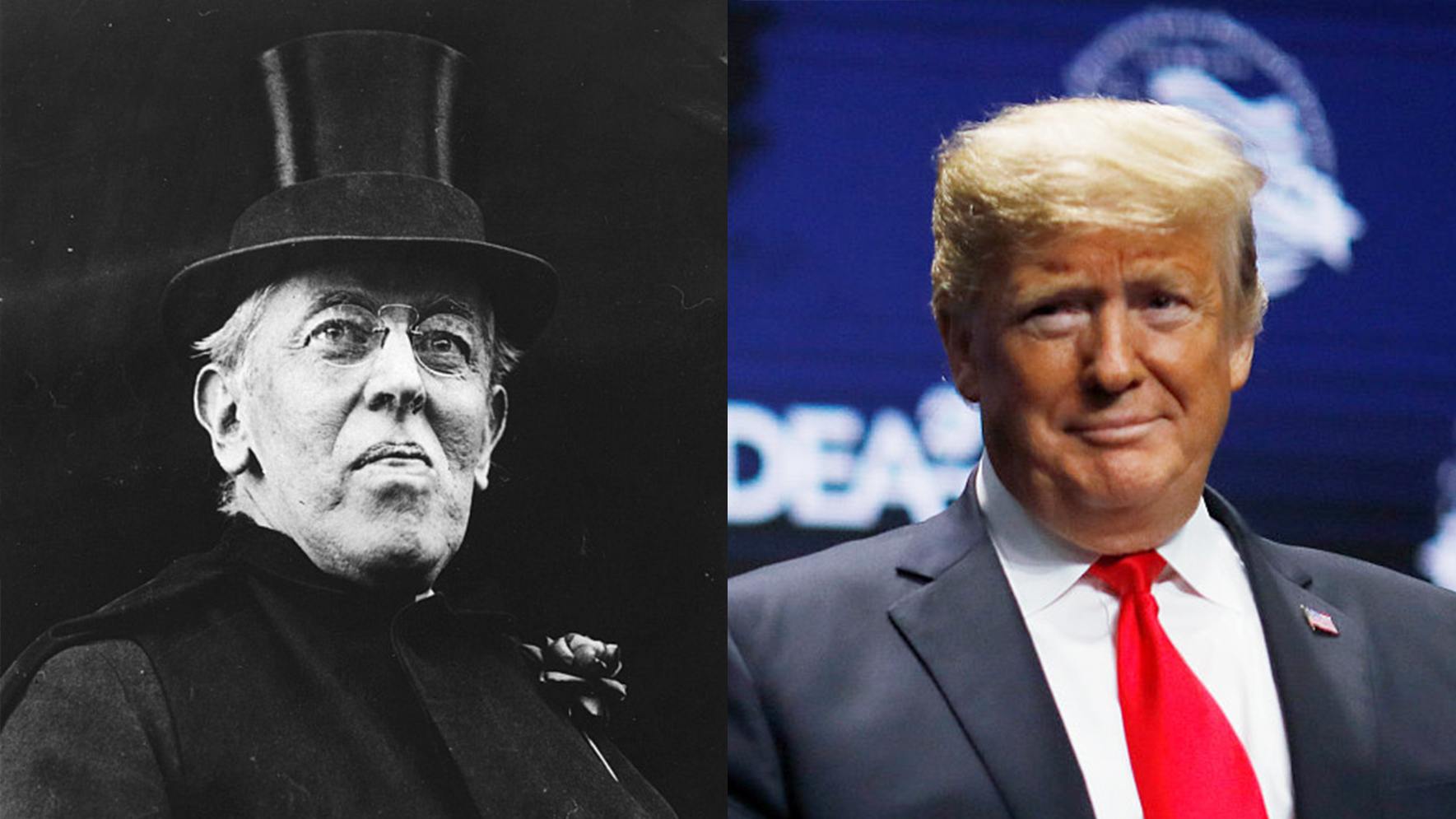A 100 years ago, on January 18, 1919, the Paris Peace Conference was held in France, to set peace terms for the defeated Central Powers including Germany, Austria-Hungary, the Ottoman Empire and Bulgaria following the end of the World War I.
Amid six-month long bickering and negotiations in the conference, the then emerging power – the United States tried to challenge the international order of the “old world” dominated by countries like Great Britain and France through the Fourteen Points peace plan brought there by then U.S. President Woodrow Wilson.
What is the “Fourteen Points”?
First revealed a year prior to the Paris Peace Conference by Wilson during a speech to the U.S. Congress, the Fourteen Points was meant to be used as new guidance for restoring lasting peace to Europe after WWI.
Among the terms, proposals such as open covenants of peace, freedom of navigation, free and equal trade, reduction of arms, and impartial adjustment of all colonial claims stood out as strikingly groundbreaking.
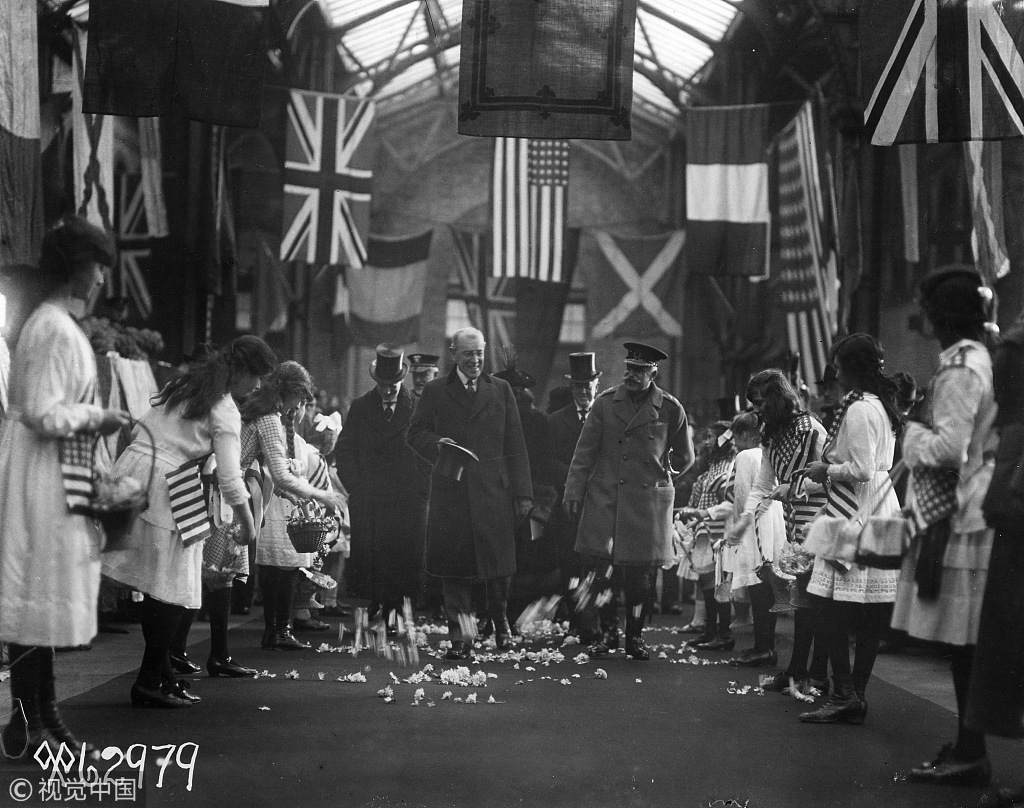
While the preliminaries for the opening of the Paris Peace Conference were being arranged, United States President Woodrow Wilson visited England where he received an enthusiastic reception in London, U.K. 1919. /VCG Photo
While the preliminaries for the opening of the Paris Peace Conference were being arranged, United States President Woodrow Wilson visited England where he received an enthusiastic reception in London, U.K. 1919. /VCG Photo
In the Fourteen Points, President Wilson also suggested a group of nations be formed to guarantee the members' political independence and territorial integrity.
However, the Fourteen Points met considerable resistance from the UK and France at the Paris Peace Conference, thus generally were not implemented as they were designed.
The united organization of nations proposed by Wilson was established in January 1920 under the name of “the League of Nations”, but the U.S. never became a member of it due to its Congress' disapproval, and the League existed for only 26 years.
The spirit of Wilsonianism has been carried on
In many historians' eyes, the Fourteen Points, or rather, Wilsonianism, to which those peace terms were attributed, was a failure, yet its spirit has outlived its time, and has become an enduring trait in the foreign policies adopted by generations of U.S. administrations to come, having far-reaching ramifications worldwide.
Daniel Wagner, author on current affairs, said in an article on the website of the Huffington Post, “In the Post-War era, Wilsonianism (liberal internationalism) and Rooseveltism (collective action based on alliances and mutual respect) have been the cornerstone of international relations.”
Based on the spirit of Wilsonianism, an array of global institutions was founded with the U.S. often being the biggest sponsor. Among them, prominent ones include the United Nations – the incarnation of the League of Nations and the World Trade Organization (WTO).
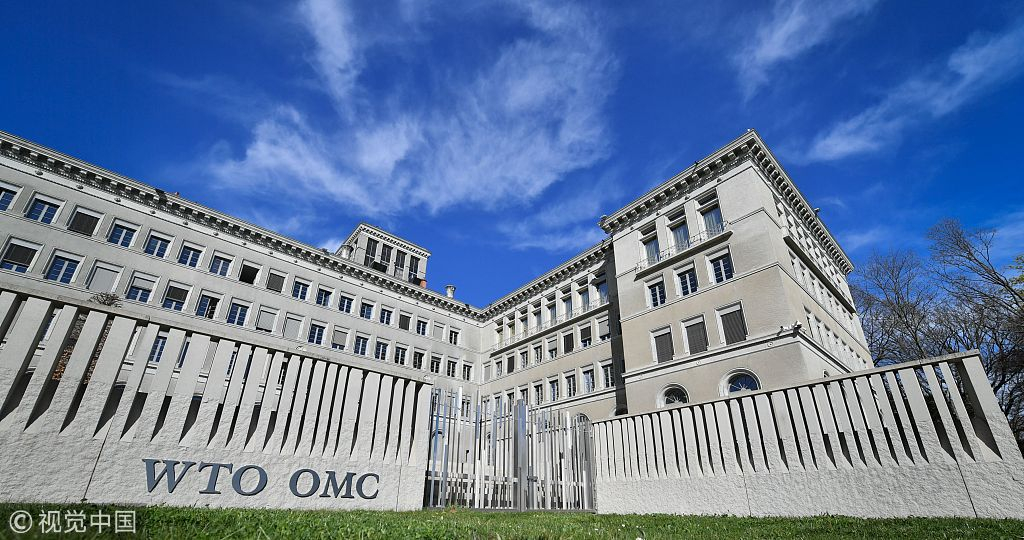
The World Trade Organization (WTO) headquarters are seen in Geneva, April 12, 2018. /VCG Photo
The World Trade Organization (WTO) headquarters are seen in Geneva, April 12, 2018. /VCG Photo
“The world has benefited greatly from the creation of many multilateral institutions which have fostered a climate of governance, transparency, and accountability – and a willingness to tackle a plethora of issues concerning humanity head on – ranging from climate change to immigration flows to conflict resolution,” according to Daniel Wagner.
Trump's dystopian views risk upending the world
The 45th U.S. president seems determined to have his country break up with the multilateralist principles. Chanting “America first!”, Trump's administration has so far been very “effective” in pulling the U.S. out of global treaties and organizations.
He tore up the Iran nuclear deal, walked away from the Paris Climate Agreement, and quit the UN Human Rights Council. He announced to quit the Universal Postal Union and the 1987 Intermediate-range Nuclear Forces treaty between the U.S. and the then Soviet Union.
He even threatened to ignore the WTO, which, given his enthusiasm in staging trade wars with different countries around the world, is hardly a surprise.
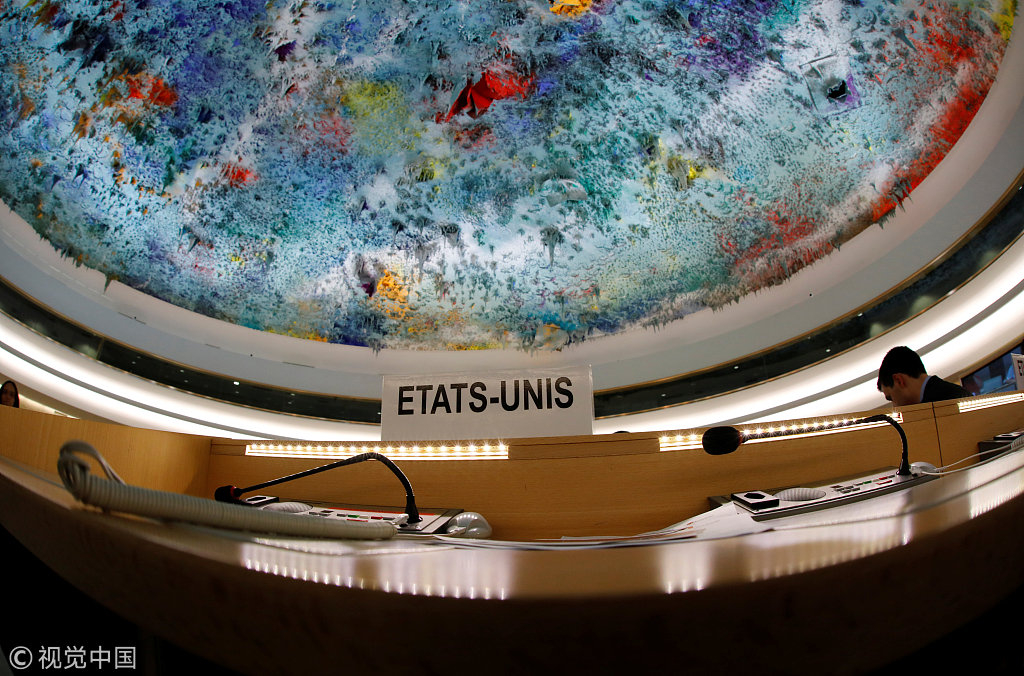
The name place sign of the United States is pictured one day after the U.S. announced their withdrawal during a session of the Human Rights Council at the United Nations in Geneva, Switzerland, June 20, 2018. /VCG Photo
The name place sign of the United States is pictured one day after the U.S. announced their withdrawal during a session of the Human Rights Council at the United Nations in Geneva, Switzerland, June 20, 2018. /VCG Photo
The Trump administration's unilateral moves have worried many.
“All this reflects Trump's contempt for pluralism, for good-faith negotiation, for an ethic of mutual but proportional obligations and responsibilities, and for loyalty to fair processes over self-serving outcomes…” said Trygve Throntveit, dean's fellow for civic studies at the University of Minnesota's College of Education and Human Development.
Ian Bond, director of foreign policy at the Center for European Reform, said: “If the leader of the nation that designed most of the main international institutions has lost confidence in their ability to protect American interests, then the world is moving into a dangerous period.”
Is Trump following Wilson?
While Trump's withdrawal from the multilateral platforms looks like a noticeable departure from the Wilsonian principles, the final goals of the two presidents may not be much different.
“After WWI broke out, the United States expanded its economy to a climax while the European colonizers were fighting each other. The Wilson administration, with the backing of a strong economy, was attempting to realize its country's goal of leading the world as the top arbitrator,” Professor Li Qing from China's University of International Relations wrote in an essay on the influence of the Wilsonian foreign policy.
Indeed, the adoption of Wilsonianism represented a significant turn in the U.S. foreign policy. It changed the policy's direction from upholding the Monroe Doctrine, under which the U.S. pledged not to interfere with existing European colonies nor meddle in the internal concerns of European countries, to a much more active and interventionist diplomacy.
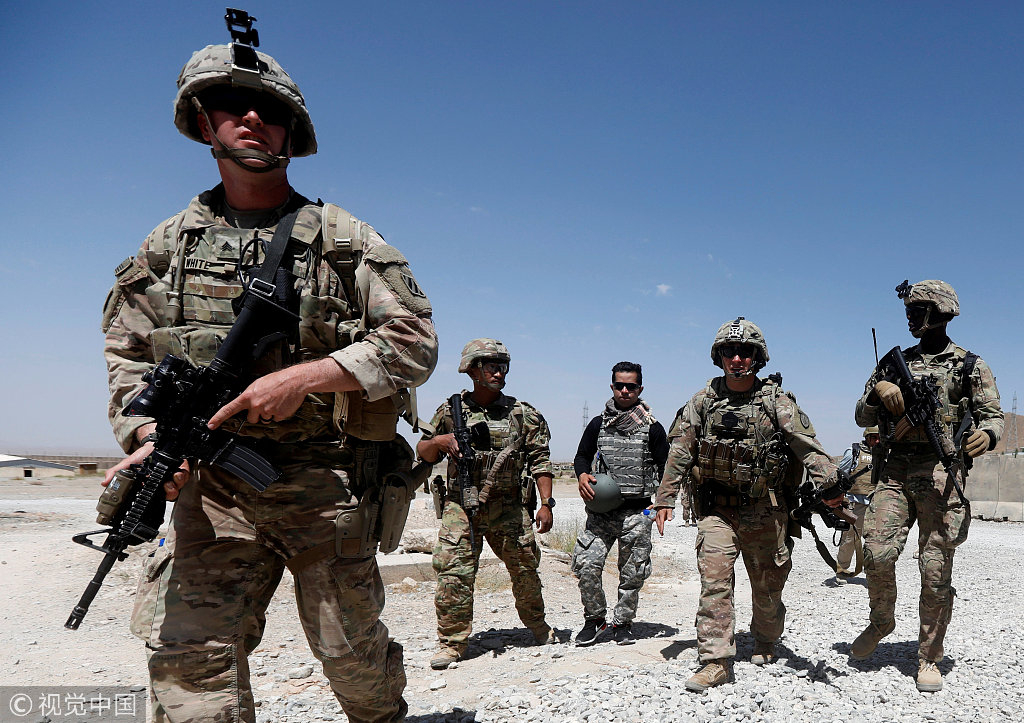
U.S. troops patrol at an Afghan National Army (ANA) Base in Logar province, Afghanistan, August 7, 2018. /VCG Photo
U.S. troops patrol at an Afghan National Army (ANA) Base in Logar province, Afghanistan, August 7, 2018. /VCG Photo
There are many examples of the U.S. interventions in countries around the world throughout the 20th century until now, be it the global institutions set up with the support of the U.S., or the brutal wars the U.S. fought in Vietnam, Iraq, Afghanistan and Syria.
From non-interference to interference, this transition ushered in an era where the U.S., with the help of a steadily growing economy, replaced former major powers like Great Britain and France, and finally assumed the helm of the unrivaled superpower in the world.
It is only natural for Trump to want to maintain that supremacy.
During Trump's presidential campaign, his promise to boost defense spending was a big part. When he signed the 2019 defense budget which is worth 716 billion U.S. dollars, he called it “the most significant investment in our military in our warfighters in modern history”. Keeping to build up its military might is the key to maintain the U.S. global hegemony, and Trump knows that.
Despite shouting "America First!" and "Make America Great Again!", Trump "is not an isolationist as some see him", the New York Times quoted Russel Mead, a professor at Bard College. He said Trump is actually "reinventing" internationalism to take on opponents "like Russia, Iran and China in a more cleareyed way".
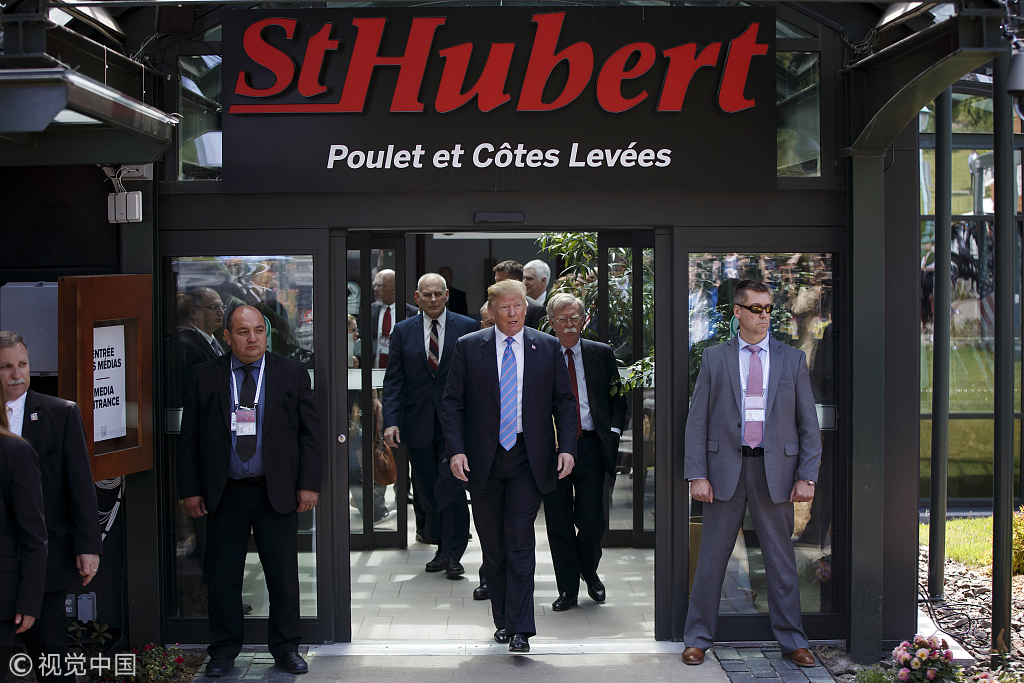
U.S. President Donald Trump, center, John Bolton, national security advisor, center right, and John Kelly, White House chief of staff, center left, depart a meeting during the Group of Seven (G7) Leaders Summit in La Malbaie, Quebec, Canada, on Saturday, June 9, 2018. /VCG Photo
U.S. President Donald Trump, center, John Bolton, national security advisor, center right, and John Kelly, White House chief of staff, center left, depart a meeting during the Group of Seven (G7) Leaders Summit in La Malbaie, Quebec, Canada, on Saturday, June 9, 2018. /VCG Photo
Through calling for "renegotiation" of the Iran nuclear deal, blasting the UN Human Rights Council for its "political bias" against its staunchest ally Israel and other moves, the U.S. has shown its agitation about losing control over the global institutions it once created and about not being the only important voice the whole world listens to.
The obsession about turning all multilateral frameworks into bilateral ones is also a conspicuous attempt by the Trump administration to regain the power of discourse and reset the rules in favor of the U.S.
In a world that is already more globalized than it was in Wilson's times, would an approach different to Wilson's multilateralism help maintain the U.S. supremacy that Trump's predecessors achieved?

